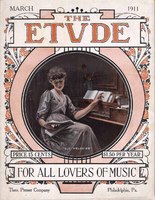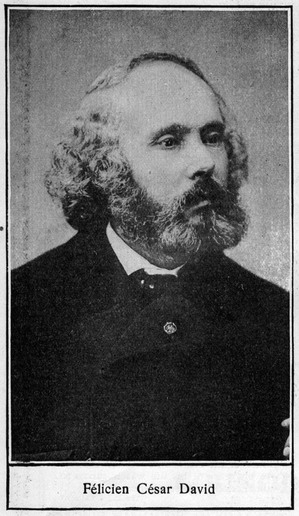 FÉLICIEN CÉSAR DAVID.
FÉLICIEN CÉSAR DAVID.
(Dah-veed.)
David was born at Dadenet, France, April 13, 1810, and died near Paris, August 28, 1876. He composed hymns, motets, etc., when a child. His early education was received at Aix, where he also commenced his musical career, but in 1830 he went to Paris. Here he was received kindly by Cherubini, and studied harmony under Millot at the Conservatory, at the same time receiving harmony lessons from Réber. He studied counterpoint and fugue with Fétis. In 1835 he became associated with the St. Simoniens, and lived for a while in the kind of convent of the brotherhood, presiding over the music. When the brotherhood was dissolved in 1831, David went to Marseilles with some co-religionists, where his music was well liked. Subsequently he went to the Holy Land and Egypt, but returned to Paris in 1835. He was not well received, however, and retired to Igny for several years, devoting himself to composition. In consequence of some of his songs becoming popular he went to Paris in 1841. His chief work, an “ode-symphony” entitled Lé Desert, was produced at this time. Several large works followed, but none very successful until an opera comique, the Perle du Brésil (1851), made a hit. Other operas followed with varying success. David succeeded to Berlioz’ chair in the Académie, and for the last seven years of his life was librarian to the French Conservatoire.
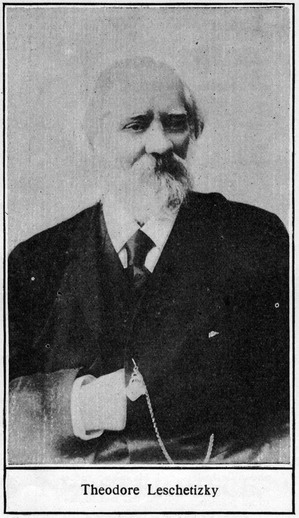 THEODORE LESCHETIZKY.
THEODORE LESCHETIZKY.
(Lesh-eh-tits-ke.)
Leschetizky was born at Lancut, Austrian Poland, June 22, 1830. He was first a pupil of his father, a well-known teacher in Vienna, but later he became a pupil of Czerny for piano and Sechter for composition. When fifteen years old he commenced teaching—a form of musical endeavor in which he was to win the highest distinction. He also studied at the University of Vienna until that institution was closed on account of the revolution. From 1842 to 1849, and again in 1852, he made highly successful tours as a concert pianist, and soon established his reputation. After this he went to St. Petersburg, where he became a teacher at the Conservatorium, besides giving many private lessons, playing, composing and acting as conductor to the Grand Duchess Helen during Rubinstein’s absences. Owing to ill health he was obliged to leave Russia in 1878, going on tour through Holland and Germany, also appearing in London and again, in Vienna. He married his former pupil, Anne Essipoff, in 1880, and settled down as a teacher. In this connection he has achieved a very high reputation; among his most famous pupils may be mentioned Mrs. Bloomfield-Zeisler, Gabrilowitsch, Mark Hambourg, Katherine Goodson and Paderewski. As a composer his opera Die Erste Falte has been successfully produced in Prague and Wiesbaden, and his piano pieces, such as the Two Larks are well known to all pianists.
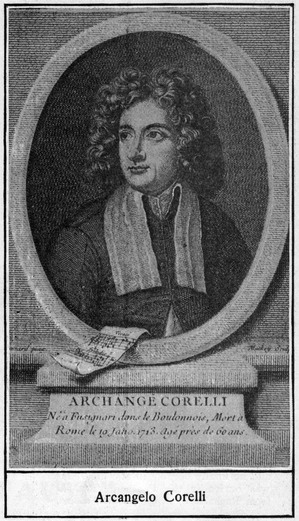 ARCANGELO CORELLI.
ARCANGELO CORELLI.
(Koh-rel’-lee.)
Corelli was born at Fusignano, Imola (Italy), February 12 or 13, 1613; died at Rome, January 10, 1713. He studied counterpoint under Matteo Simonelli, and the violin under Bassani. He appears to have traveled considerably in his youth, and stayed for some time with the Elector of Hanover at Munich. Before 1685, however, he returned to Rome and produced his first work, twelve sonatas. He became a great favorite and secured the patronage of Cardinal Ottoboni. He lived in the palace of the cardinal practically all the remainder of his life, and became a great favorite. As a composer he considerably added to the technic of the orchestra and to the possibilities of the art. As a violinist he was virtually the founder of the school which has solidity of technic with purity of tone for its ideals. In this way he became famous as a teacher throughout Europe, and had many pupils from Paris, Antwerp, Amsterdam, London, as well as Italy. About 1708 he visited Naples, where he performed before the King of Naples under the leadership of Alessandro Scarlatti. Unfortunately he made mistakes and failed to please. Much mortified he returned to Rome, only to find that a new violinist was creating a sensation. He took these mishaps so much to heart that his health began to fail, and he finally became ill and died. He was buried in the Pantheon, not far from Raphael.
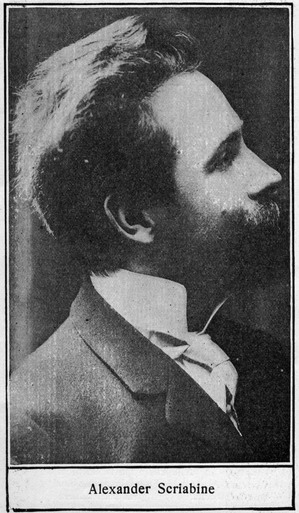 ALEXANDER SCRIABINE.
ALEXANDER SCRIABINE.
(Scree-ah’-been.)
Scriabine was born at Moscow, Russia, January 10, 1872, and began life as a soldier. He entered the Cadet Corps, but found a military life was not to his liking, so he entered the Conservatorium, where he studied the piano under Safonoff, gaining a gold medal in 1892. After his success in Russia he went on tour, visiting Paris, Brussels and Amsterdam. His piano-playing was well received and his compositions also enhanced his reputation abroad, and on his return home he became professor of the piano at the Conservatorium, Moscow. He retained this post from 1898 until 1903. He toured America with success a few years ago. Scriabine is regarded as one of the foremost of the younger school of Russian composers, and there are many people who believe that we must look to Russia for the next great composer. He has composed very largely in the smaller forms, and seems, like Chopin, to prefer to express himself by means of preludes, nocturnes, etc. His Opus 9, Nos. 1 and 2, a prelude and nocturne for the left hand, are being played by many of the foremost virtuosos, and are remarkable examples of this “single-handed” kind of music. He has also composed two symphonies, a Reverie and a Piano Concerto for the orchestra, and for the piano has written three sonatas, an Allegro appassionato, a Concert Allegro, a Fantasia and other smaller works.
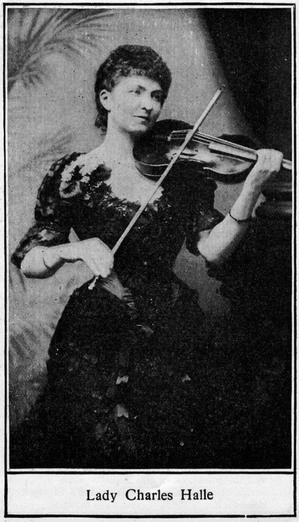 LADY CHARLES HALLE.
LADY CHARLES HALLE.
(Mme. Norman-Neruda.)
Wilma Neruda was the daughter of Josef Neruda, organist of the cathedral at Brünn, and was a member of a family famed as violinists. She was born March 29, 1839, and commenced to play the violin very early in life. Her first public appearance was made in 1846 at Vienna, where she created much astonishment by her ability. The family then went on tour through Germany. She appeared in London with great success in 1849, and afterwards went to Russia, where she remained several years. In 1864 Mme. Neruda appeared in Paris, where she awakened the greatest enthusiasm. It was at this time that she married Ludwig Norman, a Swedish musician, and took the name of Norman-Neruda. After her marriage she appeared in London, 1869, and was induced to remain for the winter season. From that time on she appeared for many years in England during the winters. Her marriage with Sir Charles Hallé took place in 1888, and she appeared in concerts with him until his death in 1896. Her eldest son was killed in an Alpine accident in 1898, and since then she has resided in Berlin, though she pays annual visits to England, where she is much beloved. In 1901 Queen Alexandra of England conferred upon her the title of “Violinist to the Queen,” and the Stradivarius upon which she is accustomed to play was the joint gift of the Duke of Edinburgh, Earl Dudley and the Earl of Hardwick.
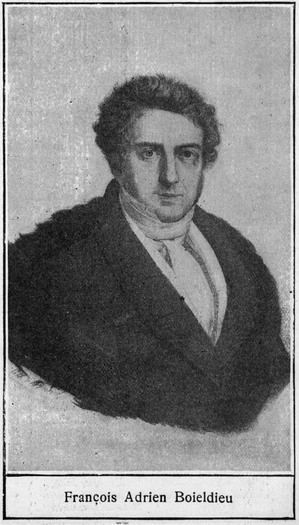 FRANÇOIS ADRIEN BOIELDIEU.
FRANÇOIS ADRIEN BOIELDIEU.
(Bwahl-d’yuh’.)
Boieldieu was born at Rouen, December 16, 1775, and died near Grosbois, October 8, 1834. His home life was unhappy, so he lived with his first teacher of music, Brocoe, who was an excellent musician, but a drunkard. Nevertheless, Boieldieu made great progress, and his first opera, with a libretto by his own father, was successfully produced at Rouen, 1793. A second opera, also successful, followed, and in 1795 Boieldieu boldly set out for Paris. He was well received by Cherubini and Méhul, and also became acquainted with the tenor Garat. Garat sang Boieldieu’s songs, and they became very popular. Much success was also achieved by the light operas of this period. In 1800, however, Boieldieu became professor of piano at the Conservatoire, and devoted himself to a rigorous course of study in composition, aided, some say, by Cherubini. Boieldieu went to St. Petersburg in 1803, where he was conductor of the Imperial opera for eight years. At the end of that time he returned to Paris and produced Jean de Paris. This is one of his most successful operas, and is only surpassed by La Dame Blanche, written fourteen years later. La Dame Blanche placed Boieldieu at the head of his particular school of opera comique and is in some respects unrivaled. Boieldieu became the victim of pulmonary trouble, and suffered also heavy financial loss. Finally the King granted him a government pension.


